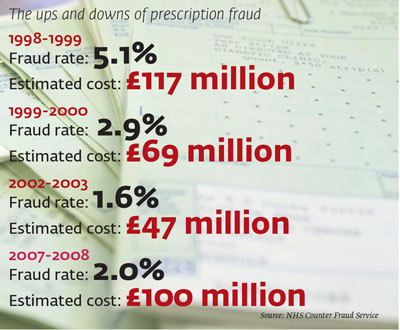Fraud risk 'high' as prescription checks fall 40 per cent
As a C+D Freedom of Information request reveals a dramatic fall in prescription fraud checks in 2013, a leading accountancy firm warns of the consequent burden on the NHS' resources
EXCLUSIVE
Prescription fraud checks fell by 40 per cent in 2013 amid the transfer of responsibility from PCTs to NHS England, C+D has learned.
Only 150,376 prescription forms were checked in 2013 – just 0.03 per cent of the 492 million forms dispensed during the year – information obtained by C+D under the Freedom of Information Act revealed.
This compared with 248,991 checks in 2012 on a lower volume of 479m forms – a rate of 0.05 per cent – NHS figures revealed.
NHS England, which took on the responsibility for fraud checks as a result of the health service reforms last April, stressed that it was "taking steps" to protect against patients fraudulently claiming exemption from prescription charges. But experts warned that now was the wrong time to decrease the number of checks.
|
Only 150,376 prescription forms were checked in 2013 compared to 248,991 the previous year, the Freedom of Information request reveals |
 More on pharmacy fraud
|
|
Accountancy firm EY (Ernst & Young) branded the risk of fraud "high" at a time when people were feeling the effects of the economic downturn. Prescription fraud in England was estimated to cost the NHS £100m a year in 2008, when the most recent cost analysis was conducted by the NHS Counter Fraud Service (see below). |
 EY fraud investigations specialist Sara Fowler argued that this could prove detrimental to the NHS. "People claiming exemption from prescription charges when they are not entitled to increases the burden on the already constrained resources of our health system," she warned.
EY fraud investigations specialist Sara Fowler argued that this could prove detrimental to the NHS. "People claiming exemption from prescription charges when they are not entitled to increases the burden on the already constrained resources of our health system," she warned.
The government should create a "zero-tolerance culture" towards fraud and work with pharmacists and local authorities to prevent further losses (see below), she suggested.
NHS Alliance said the introduction of the electronic prescription service could also help combat fraud. But it pointed out that people could be defrauding the system simply because they were unable to afford their medicines – citing the rise of the prescription charge to £8.05 in April as a potentially aggravating factor.
NHS Alliance pharmacy lead Mark Robinson said he saw many people struggling to keep working when suffering from health problems. "The cost of their prescriptions is just another burden that they have to bear," he argued. "There is a real need to look at how medicines for people with long-term conditions are made affordable to everyone who needs them."
Independent Pharmacy Federation chair Fin McCaul echoed the point. "Prescription charges are going up and patients can't afford their medicines, so there's more likely to be abuse of the system," he told C+D. But he stressed that minimising fraud was still important. "The impact on the NHS will probably be quite significant if it's not being picked up," Mr McCaul said.
"The NHS, like other public-sector organisations, has to cope with the increased risk of fraud against a backdrop of increasing demand for resources and related budget constraints. It can be very difficult for an organisation to know where best to direct its limited resources to guard itself against fraud and, particularly given the manual nature of the prescription process, the costs of checking millions of prescriptions each year would be a huge stretch on resources.
However, there are steps that the NHS can take to improve its levels of protection, some of which may be implemented quickly and relatively cost effectively:
● Emphasise the fraud risk to pharmacists, reminding them that requesting adequate evidence of a valid exemption is an important element in fraud prevention and advertising to patients that evidence is required
● Create a zero-tolerance culture to deter would-be fraudsters by publicising examples of identified fraud that have led to prosecutions
● Support knowledge-sharing and increased communications with benefit teams at local authorities to enhance the checking process
● Move towards greater automation of checking procedures wherever possible, as use of data analytics can be a real help in improving the efficiency and effectiveness of fraud detection techniques."
 |
|
 |
If GPs were required to collect evidence of exemptions from patients as they registered with the surgery, would that cut the level of fraud?
We want to hear your views, but please express them in the spirit of a constructive, professional debate. For more information about what this means, please click here to see our community principles and information
|


 Fake medicines entering European supply chain, claims Pfizer chief
Fake medicines entering European supply chain, claims Pfizer chief
